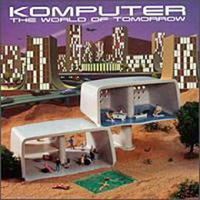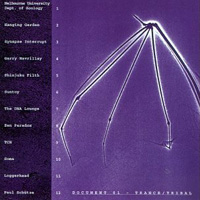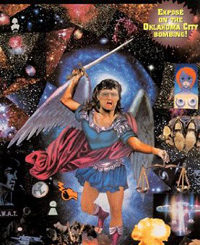 Komputer
Komputer
The World of Tomorrow (Mute)
by Lex Marburger
Professor Hjør tapped on the podium. “Now, if you’ll turn to page 362, we’ll begin our discussion of the concept known as ‘retro.’ Don’t interrupt. As it clearly shows in paragraph four, any good, or relatively new idea will inevitably be repeated endlessly until it has become a ‘trend.’ Then, as time passes, usually a period of one generation, the idea will resurface with a new name, and a new face (cross reference, if you will, ‘glam rock’ with ‘industrial,’ noting also how (ahem) Marilyn Manson was much more adept at arranging cover versions of previously recorded material than writing original songs).
“However, if an idea is considered ‘before its time,’ or in the vernacular, ‘too weird,’ there will be no ‘trend’ per se, but rather the following generation will render it with ‘cult status’ and it will only be imitated once or twice (see The Fall, Can, Eno, et. al.). Specifically, we shall look at a band known as Kraftwerk, its latter-day counterparts, Komputer, and their album The World of Tomorrow. The idea of futurism, of clean, sleek lines, minimalism, and a technology-driven society, was the primary driving force behind Kraftwerk’s wholly electronic music in the ’70s and ’80s (an exception being the track ‘Metal on Metal’ during the recording of Trans-Europe Express). These ideas, methods, and sounds have been surgically lifted from the past and grafted seamlessly onto the more advanced systems of the late ’90s.
“See how ‘Bill Gates,’ a reference to one of the early mythological demons of cyberspace, who apparently was attributed the power to smash entire financial collectives (known as ‘businesses’) by merely wiping his spotty brow, matches the vocals and progressions of ‘Man Machine.’ But the musical styles do not end there. Throughout the tracks on The World of Tomorrow, keyboard glissandos and one- or two-word repetition, usually in a rising cadence, appear over metronomic drum tracks. In no way do they vary their reflection of Kraftwerk, a band that, surprisingly, few people in the last years of the 20st century had even heard.
“So, you may ask how Komputer differs? First and foremost, Komputer appeared 20 years after Kraftwerk, all stylistic and idealistic innovations and catastrophes (see ‘parachute pants,’ ‘Van Hagar,’ etc.) have to be taken into account. Specifically, in the area of ‘computer music,’ the spacious and hypnotic rhythms of Kraftwerk, simple and robotlike, were advanced and accelerated, leading to a more chaotic, cluttered sound. Likewise, the keyboard riffs, although rudimentary, have more syncopation and rhythmic texture, as the aesthetic mode of society at the time dictated.
“Were, you may ask, Komputer well received? People known as ‘music critics’ – a polite term for repressed and irrelevant citizens who knew too much about what they liked, not enough about what they didn’t, cajoled companies to give them product for free and, as it was said, had ‘no life’ – who understood the idea of ‘conceptual recycling’ and also were familiar with Kraftwerk enjoyed the album very much, as did individuals who were pleased by the exciting sterility The World of Tomorrow provided. On the other hand, there were those who still preferred that barbaric instrument, the ‘guitar.’ They, suffice it to say, were less than thrilled.
“Tomorrow, I want you to read chapter eight, ‘The Transition from “Breaking a String” to “Crashing the System”.’ That’s all. Oh, there will be a quiz on Friday.”



